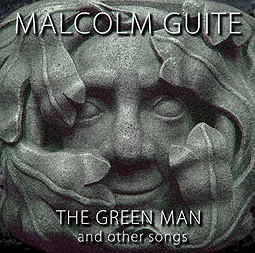Search
CD review: The Green Man and Other Songs – Malcolm Guite

Carved in the choir by your fathers in days of yore.
I'm the power in the pulse, I'm the song underneath the soil
I'm the unseen king of the ditches, ragged and royal
‘Home grown' is an appropriate phrase for this album - for a variety of reasons. First of all, there's the title track, which - as the opening lines above show - not only praises the raw, vital energy of all that is natural in the world, but hints at a kind of persistent, everpresent spiritual power within it that simply refuses to be extinguished (in that it's similar in its themes to Jethro Tull's Jack-in-the-Green, though in its infinitely more down-to-earth approach is in many ways more successful).
But also this album is itself very much a home grown affair: honest, down-to-earth, no messing about, warts and all. As Malcolm Guite sings in the Dylanesque Golden Top Guitar:
He's nothin' to look at - nothin' to see
He ain't gonna make it on MTV
He knows too much to dream about being a star
But he can lift your heart with his Golden Top Guitar
In other words, if you're looking for slick production values or flashy musicianship, you won't find it here. But that's not really what it's about. It's about that song underneath the soil - about something of deeper, more fundamental value that drives this collection of self-penned songs.
Malcolm Guite's pedigree - as a poet, Christian priest and member of the blues band Mystery Train - all come to the fore, but in a refreshingly undogmatic way. The acoustically-driven songs generally have more of a country feel than blues, of a kind that Dylan or Cash would be comfortable with, and this is certainly no sermon (how often does your local vic come out with ‘If life was a test, no one would pass / Got a few years left, gonna kick some ass'?). It is shot through with a kind of yearning for the spiritual that lifts it above mere tunemaking or storytelling, but Guite is always very much one of us - everyman, imperfect, questioning, not necessarily finding answers but questing after them nonetheless.
No song sums this up better than the punning, Cash-style Try For the Son - which is also one of the most satisfying songs musically - in which he seems to be criticising someone for wanting too much out of life, then admits ‘You think I want less - believe me, I want more'. Slowly you realise that what's being criticised isn't simply ‘wanting', but the wanting of material things at the expense of what's truly important in life.
You want the song - I want the one who played it
You want the world - I want the one who made it
All right then, you take the many, I'll take the one
You can add to your collection - it'll never get done
You can cry for the moon - I'm gonna try for the son
It's a theme that occurs again and again, through the gospel-blues of Empty Things to the wry New TV, which, I'm pretty sure, Johnny Cash would have been more than happy to sing:
You got a brand new Berghaus jacket
People would kill for your shoes
You got a house they might repossess
You got a job you might lose
You've got a DVD collection
With titles that the law should never see
But no matter where you plug it in
You can't get any love from your new TV
Country music is lyric led, and it's the thoughtfulness and wit of the lyrics and the quality of the songs that you take away from this album. Plus the feeling that you've spent some time with a pretty decent bloke. And if it does nothing more than make you want to see and hear him perform, it will have done its job - for it's out among the people in some smokey (oops, sorry - make that ‘smokeless') bar that these songs, and Malcolm himself, clearly belong.
Witer: Toby Venables